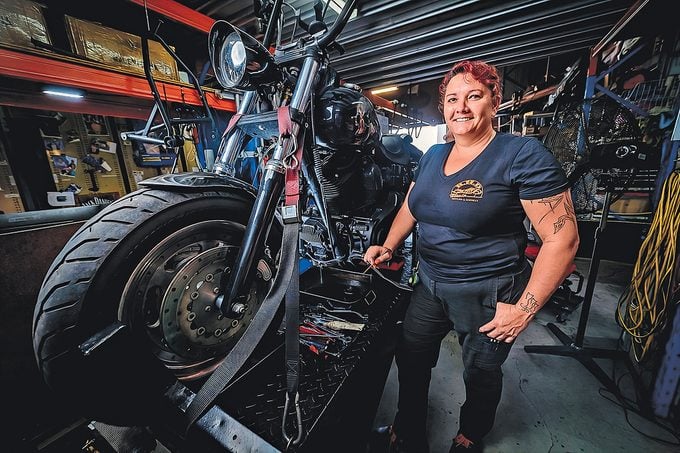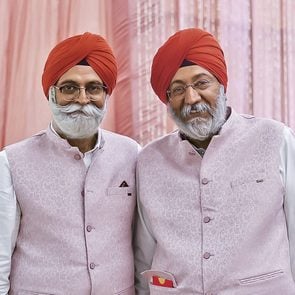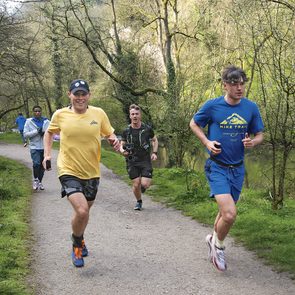Meet the Mechanic Who Modifies Bikes for Injured Veterans
Sharine Milne, an Australian mechanic, customizes bikes so that injured veterans can get riding again.

Holding a flashlight between her teeth, Sharine “Spanner” Milne adjusts the shock of a Harley Davidson Sportster at the motorcycle repair shop she owns in Townsville, Queensland, in northeastern Australia. Her fingers—long nails painted in flaming orange—work the pocket-sized wrench near the bike’s brakes.
Over the past three years, the 46-year-old mechanic, and owner of R.H.D. Classic Supplies & Services, has made several modifications to this bike, which belongs to a customer named Stewart, a 72-year-old orchid farmer. Stewart’s right leg was amputated so he wears a prosthetic, and he recently broke his left ankle. To make the motorcycle work for him, Milne adjusted the seat and handlebars to help with his back pain and, most recently, installed an electronic gear shift for him to use while his ankle heals. Giving up riding was never an option for Stewart.
“I’d hate someone telling me I can’t ride,” says Milne, who knows firsthand what it’s like to overcome a “life injury”—the term she prefers to use instead of disability. Milne was born with bilateral dislocated hips. Doctors told her she wouldn’t be able to have children and that by the time she was 40, she would no longer be able to walk without assistance. She proved them wrong on both accounts.
“I didn’t let it stop me,” says Milne, an Indigenous woman and mother to a grown daughter. Today, not only does she walk, but she also rides motorcycles and has amassed a large collection of bikes over the years.
Twenty-one years ago, as a single mother juggling three jobs in hospitality and hardly seeing her five-year-old daughter, Milne decided to return to school and enrolled in a pre-vocational automotive course. But as a woman aiming to become a motorcycle technician, she faced a lot of doubters. “I got laughed out of five shops,” she says.
Eventually Milne landed at R.H.D. Classic, first as a student, then as an apprentice and eventually taking over ownership of the shop in 2012. Kirsty, her former boss’s daughter, who is deaf and uses a wheelchair, gave her the nickname, “Spanner girl.” One of Milne’s first modifications involved setting up a sidecar for Kirsty so she could ride with her dad.
Today Milne runs a thriving business, but the injury-related modifications are her passion. Her projects range from crafting wheelchair-accessible motorcycles to converting her own sidecar into a type of hearse with a flatbed to carry her veteran customers’ caskets after they die. “The greatest respect I can pay them is to be able to take them to their final resting place,” she says.
By letting people continue to do what they love, Milne has helped them find emotional healing. David McHenry, a 55-year-old retired veteran of the Australian Defence Force with spine, hip and knee injuries from 35 years of service, turned to Milne to help ease the pain of riding for longer stretches.
“Spanner provides a safe space for veterans like me to come to when they are struggling. No judging, just comfortable conversation and some hands-on work to distract us,” says McHenry.
Along with his physical injuries, McHenry has post-traumatic stress disorder (PTSD), and his psychologist, who recommends riding as “throttle therapy,” can tell if he hasn’t been out on his motorcycle enough.
On the open road, Milne too finds a therapeutic rhythm. Some days the ride is her emotional outlet, but it’s also a way to connect with others. “On a motorcycle, I don’t feel like life’s passing me by. I’m part of it.”
Next, read about some unique ways people are giving back around the world.






